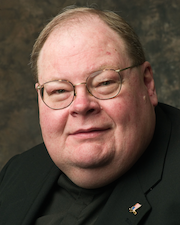Questioning the Calculations |
College Promise Programs | Donate! 


What’s AHEAD Commentary [October 2016]
To join the discussion on these commentaries, please visit our Facebook page:
https://www.facebook.com/PennAHEAD
Academic Freedom, Tenure, and Shared Governance
In our latest What’s AHEAD poll, we focused on academic freedom, tenure, and shared governance. We invited three Penn GSE alumni, all leading scholar-practitioners, to comment: Dr. Kelly Thompson (Culver-Stockton College), Dr. José Antonio Guzmán (Universidad de los Andes), and Dr. Michael Class (Marquette University).
Higher Ed Leaders Skeptical About Tenure as Key to Academic Freedom
 Kelly M. Thompson
Kelly M. Thompson
President
Culver-Stockton College
The results of the What's AHEAD poll on Academic Freedom, Tenure, and Shared Governance offered few surprises. The higher education leaders surveyed held that academic freedom is a vital good for higher education, but they were somewhat divided regarding whether the rise of non-tenure-line faculty and decline of tenure-track faculty are problematic. The respondents also largely agreed that faculty should play some role in institutional decision making, but they mostly did not see faculty or graduate student unionization as positive contributions to shared governance, presumably because they promote adversarial relationships.
Despite the lack of surprises, I found the poll results regarding academic freedom rather interesting. Poll respondents overwhelmingly agreed that academic freedom is essential in higher education. However, a decisive majority (73%) also believed that there is no clear and consistent understanding of what academic freedom actually means. These results suggest that higher education leaders should want to promote a deeper conversation about the nature and value of academic freedom. After all, if academic freedom truly is an essential good that is widely misunderstood, we may not be able to accurately identify factors that promote or threaten it.
Notwithstanding the supposed lack of a clear and consistent understanding of academic freedom, it seems that poll respondents largely agreed on what isn't a threat to academic freedom. Roughly half seemed to hold that that the rise of non-tenure-line faculty and decline of tenure-track lines are not in themselves a threat to academic freedom. Only one-third saw the rise of non-tenure-track lines as problematic, and only one-fourth agreed that tenure is essential to academic freedom. It seems clear, then, that there is a good deal of skepticism among respondents about the traditional argument that faculty tenure is the only way to ensure academic freedom. Although academic freedom is an essential good, most respondents do not think tenure is needed to protect it. We are in a time of change and experimentation in higher education, and the attitudes of leaders in higher education regarding academic freedom and tenure suggest that there will be an increasing openness to new structures for preserving traditional values.
Academic Freedom and Academic Relevance
 José Antonio Guzmán
José Antonio Guzmán
President
Universidad de los Andes, Chile
Academic freedom is an essential part of university life, yet along with it there are some other important values which must be nurtured and promoted. Among them, the importance of academic excellence and creativity should be emphasized. The American university has been one of the main levers of cultural, economic, and scientific development in the United States and in the rest of the world; it is necessary to keep the dynamism and the influence that has characterized it. The world is changing at a pace never seen before, and universities need flexibility to adapt to that speed of change to remain relevant institutions.
In this context, in which flexibility is required, the survey seems to show that tenure and shared governance must be relativized. On the one hand, the relationship between academic freedom and tenure is not as evident today as it was in 1940. On the other hand, when shared governance is misunderstood it can stunt the adaptability of universities. These institutions need to balance the influence of the wisdom of their scholars and their ability to pursue the strategic goals that society demands from them.
In Chile, the oldest universities have a very radical system of shared governance, where the faculty elect presidents and deans. (In state universities there is also tenure.) Conversely, newer universities have been reluctant to adopt shared governance in their organizations. This approach has given them great adaptability and creativity, which has allowed them to develop much faster than their older counterparts. It is true that, if they want to mature as universities, they have to create instances for the involvement of their faculty in institutional governance, but they must do so in a way that does not affect their ability to respond to social needs.
Changing Triad
 Michael Class
Michael Class
Adjunct Assistant Professor
Marquette University
Academic freedom, tenure and shared governance have long been considered to be three parts of one whole. The American system of higher education has been based upon the ideal of academic freedom and is generally considered to be one of the reasons that it has been so successful. Today, however, these three are often being pulled away from each other, and that whole is no longer universally accepted as a mark of intellectual quality.
Academic freedom is a concept that has been growing in scope for faculty members and shrinking in scope for administrators. It has allowed faculty both to pursue research topics and teach course matter without interference by administrators or outside authorities, i.e. curricular/research matters. This has bled over into shared governance when faculty have voiced opinions on curriculum changes, degree programs etc. The protection for such freedom has been tenure, granted to faculty for their proficiency in teaching, research and service to the school.
Shared governance at one time may have meant that each faculty member had a voice in decision making at the university, especially when it came to curricular/research issues. Today, that voice largely has moved from the individual to the collective, expressed through representatives on a faculty senate or council. These representative bodies have the ability to express the collective wisdom, hopefully, of the faculty to the administration. Many of these representative bodies find it difficult to find faculty members willing to serve in such a capacity, giving at least the appearance that issues of governance are not issues of personal concern any longer, but something that we no longer have to think about because we have delegated others to do so.
Tenure is a shrinking entity these days, not so much because of its use as an academic protection, but because of the financial impacts of essentially lifetime contracts. The result of this is that the link between tenure and faculty governance seems to be one that is disappearing.
To join the discussion on these commentaries, please visit our Facebook page: https://www.facebook.com/PennAHEAD



